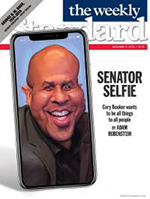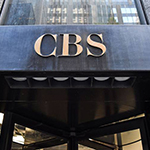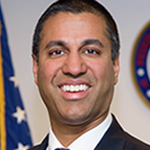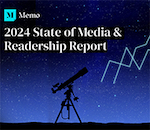 |
The Weekly Standard, a conservative news magazine that is no friend of Donald Trump, is closing down. The Dec. 17 issue of the magazine will be its last, according to parent firm Clarity Media. Clarity CEO Ryan McKibben said the news magazine “has been hampered by many of the same challenges that countless other magazines and newspapers across the country have been wrestling with,” seeing large declines in circulation over the past few years. Writers Bill Kristol and Fred Barnes founded The Weekly Standard in 1995. It was part of Rupert Murdoch's News Corp. It was acquired in 2009 by Clarity, which also owns the Washington Examiner, Colorado Springs Gazette and Colorado Politics magazine.
 |
CBS says it will donate $20 million to a group of organizations working to eliminate workplace sexual harassment. That money, however, will be deducted from any severance benefits due to ousted CBS chief executive officer Les Moonves. Recipients of the money are set to include such groups as the National Women’s Law Center, International Women’s Media Foundation, Time’s Up Legal Defense Fund and Women in Film Los Angeles. CBS worked with issue-driven communications firm Rally to determine the criteria for the grants and develop a strategy to support new and existing work. “CBS’ support of these endeavors ties into the Company’s ongoing commitment to strengthening its own workplace,” a CBS press release said. A Dec. 13 New York Times report said that CBS had agreed to a confidential settlement that would pay actress Eliza Dushku $9.5 million as a result of what she said was her wrongful termination following a series of sexual harassment incidents on the set of the network’s “Bull.”
 Ajit Pai |
The “dual network” rule, which prevents any of the big four networks (ABC, CBS, NBC and Fox) from merging, may be in the crosshairs of FCC chairman Ajit Pai. The rule is just one of several media ownership proposals set to be reconsidered during a broad review, currently underway, that Congress mandates must take place every four years. While the FCC has previously reaffirmed the rule, an FCC Fact Sheet issued on Nov. 21 questions whether it “remains necessary to promote competition, localism, or viewpoint diversity.” In a meeting on Dec. 12, Pai said that the FCC’s rules need to “keep pace” with the marketplace. Specifically, the FCC said in a report that the growth of such streaming services as Netflix, Amazon and YouTube has given the big four networks a new level of competition that makes the rule obsolete. In addition to the dual network rule, the FCC will also be considering rules that limit the number of TV and radio stations that one company can own in a single market.


 Trump Media & Technology Group today reported a $58.2M net loss on $4.1M in 2023 revenues, a disclosure that drove its stock price down 22.6 percent to $47.96.
Trump Media & Technology Group today reported a $58.2M net loss on $4.1M in 2023 revenues, a disclosure that drove its stock price down 22.6 percent to $47.96. Barry Pollack, an attorney at Wall Street’s Harris St. Laurent & Wechsler, has registered Julian Assange as a client with the Justice Dept. “out of an abundance of caution.”
Barry Pollack, an attorney at Wall Street’s Harris St. Laurent & Wechsler, has registered Julian Assange as a client with the Justice Dept. “out of an abundance of caution.” Paramount Global to slash 800 jobs in what chief executive Bob Bakish calls part of an effort to “return the company to earnings growth"... Rolling Stone editor-in-chief Noah Shachtman is exiting at the end of the month due to disagreements with chief executive Gus Wenner over the direction the magazine is taking... The New York Times broke the $1 billion barrier in annual revenue from digital subscriptions in 2023... Press Forward is investing more than $500 million to strengthen local newsrooms.
Paramount Global to slash 800 jobs in what chief executive Bob Bakish calls part of an effort to “return the company to earnings growth"... Rolling Stone editor-in-chief Noah Shachtman is exiting at the end of the month due to disagreements with chief executive Gus Wenner over the direction the magazine is taking... The New York Times broke the $1 billion barrier in annual revenue from digital subscriptions in 2023... Press Forward is investing more than $500 million to strengthen local newsrooms. The majority of news articles are read within the first three days of publication, according to a recent report.
The majority of news articles are read within the first three days of publication, according to a recent report. The Los Angeles Times gives pink slips to 115 people or 20 percent of its newsroom staff... TIME is also laying off about 30 employees, which is approximately 15 percent of its editorial staff... The Baltimore Banner, which was launched by Stewart Bainum in 2022 after he failed to buy the Baltimore Sun, added 500 subscribers per day in the three days following Sinclair Broadcast Group's deal to purchase the Sun.
The Los Angeles Times gives pink slips to 115 people or 20 percent of its newsroom staff... TIME is also laying off about 30 employees, which is approximately 15 percent of its editorial staff... The Baltimore Banner, which was launched by Stewart Bainum in 2022 after he failed to buy the Baltimore Sun, added 500 subscribers per day in the three days following Sinclair Broadcast Group's deal to purchase the Sun.


 Have a comment? Send it to
Have a comment? Send it to 
No comments have been submitted for this story yet.